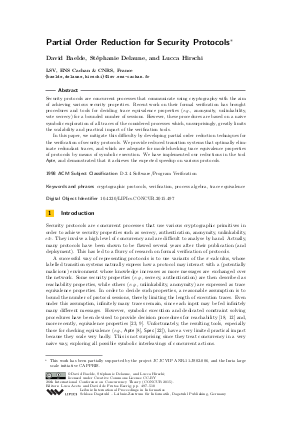Partial Order Reduction for Security Protocols
Authors David Baelde, Stéphanie Delaune, Lucca Hirschi
-
Part of:
Volume:
26th International Conference on Concurrency Theory (CONCUR 2015)
Part of: Series: Leibniz International Proceedings in Informatics (LIPIcs)
Part of: Conference: International Conference on Concurrency Theory (CONCUR) - License:
 Creative Commons Attribution 3.0 Unported license
Creative Commons Attribution 3.0 Unported license
- Publication Date: 2015-08-26
File

PDF
LIPIcs.CONCUR.2015.497.pdf
- Filesize: 0.6 MB
- 14 pages
Document Identifiers
Subject Classification
Keywords
- Cryptographic protocols
- verification
- process algebra
- trace equivalence
Metrics
- Access Statistics
-
Total Accesses (updated on a weekly basis)
0Document
0Metadata
Abstract
Security protocols are concurrent processes that communicate using cryptography with the aim of achieving various security properties. Recent work on their formal verification has brought procedures and tools for deciding trace equivalence properties (e.g. anonymity, unlinkability, vote secrecy) for a bounded number of sessions. However, these procedures are based on a naive symbolic exploration of all traces of the considered processes which, unsurprisingly, greatly limits the scalability and practical impact of the verification tools. In this paper, we mitigate this difficulty by developing partial order reduction techniques for the verification of security protocols. We provide reduced transition systems that optimally eliminate redundant traces, and which are adequate for model-checking trace equivalence properties of protocols by means of symbolic execution. We have implemented our reductions in the tool Apte, and demonstrated that it achieves the expected speedup on various protocols.
Cite As Get BibTex
David Baelde, Stéphanie Delaune, and Lucca Hirschi. Partial Order Reduction for Security Protocols. In 26th International Conference on Concurrency Theory (CONCUR 2015). Leibniz International Proceedings in Informatics (LIPIcs), Volume 42, pp. 497-510, Schloss Dagstuhl – Leibniz-Zentrum für Informatik (2015)
https://doi.org/10.4230/LIPIcs.CONCUR.2015.497
BibTex
@InProceedings{baelde_et_al:LIPIcs.CONCUR.2015.497,
author = {Baelde, David and Delaune, St\'{e}phanie and Hirschi, Lucca},
title = {{Partial Order Reduction for Security Protocols}},
booktitle = {26th International Conference on Concurrency Theory (CONCUR 2015)},
pages = {497--510},
series = {Leibniz International Proceedings in Informatics (LIPIcs)},
ISBN = {978-3-939897-91-0},
ISSN = {1868-8969},
year = {2015},
volume = {42},
editor = {Aceto, Luca and de Frutos Escrig, David},
publisher = {Schloss Dagstuhl -- Leibniz-Zentrum f{\"u}r Informatik},
address = {Dagstuhl, Germany},
URL = {https://drops.dagstuhl.de/entities/document/10.4230/LIPIcs.CONCUR.2015.497},
URN = {urn:nbn:de:0030-drops-53946},
doi = {10.4230/LIPIcs.CONCUR.2015.497},
annote = {Keywords: Cryptographic protocols, verification, process algebra, trace equivalence}
}
Author Details
References
-
M. Abadi and C. Fournet. Mobile values, new names, and secure communication. In Proceedings of POPL'01. ACM Press, 2001.

-
J.-M. Andreoli. Logic programming with focusing proofs in linear logic. J. Log. Comput., 2(3), 1992.

-
A.V. Anisimov and D.E. Knuth. Inhomogeneous sorting. International Journal of Computer & Information Sciences, 8(4):255-260, 1979.

-
D. Baelde, S. Delaune, and L. Hirschi. A reduced semantics for deciding trace equivalence using constraint systems. In Proc. of POST'14. Springer, 2014.

-
David Baelde, Stéphanie Delaune, and Lucca Hirschi. Partial order reduction for security protocols. CoRR, abs/1504.04768, 2015.

-
C. Baier and J.-P. Katoen. Principles of Model Checking (Representation and Mind Series). The MIT Press, 2008.

-
Mayla Bruso, K. Chatzikokolakis, and J. den Hartog. Formal verification of privacy for RFID systems. In Proc. of CSF'10, 2010.

-
V. Cheval. Apte: an algorithm for proving trace equivalence. In Proc. TACAS'14, 2014.

-
V. Cheval, H. Comon-Lundh, and S. Delaune. Trace equivalence decision: Negative tests and non-determinism. In Proc. of CCS'11. ACM Press, 2011.

- V. Cheval and L. Hirschi. sources of APTE, 2015. URL: https://github.com/APTE/APTE.
-
E. Clarke, S. Jha, and W. Marrero. Efficient verification of security protocols using partial-order reductions. Int. Journal on Software Tools for Technology Transfer, 4(2), 2003.

-
H. Comon-Lundh, V. Cortier, and E. Zalinescu. Deciding security properties for cryptographic protocols. Application to key cycles. ACM Transactions on Computational Logic (TOCL), 11(4), 2010.

-
Cas JF Cremers and Sjouke Mauw. Checking secrecy by means of partial order reduction. In System Analysis and Modeling. Springer, 2005.

-
Pierpaolo Degano, Rocco De Nicola, and Ugo Montanari. A partial ordering semantics for ccs. Theoretical Computer Science, 75(3):223-262, 1990.

-
S. Delaune, S. Kremer, and M. Ryan. Verifying privacy-type properties of electronic voting protocols: A taster. In Towards Trustworthy Elections - New Directions in Electronic Voting, volume 6000. Springer, 2010.

-
Patrice Godefroid. Partial-Order Methods for the Verification of Concurrent Systems - An Approach to the State-Explosion Problem, volume 1032 of Lecture Notes in Computer Science. Springer, 1996.

- L. Hirschi. APTE with POR. URL: http://www.lsv.ens-cachan.fr/~hirschi/apte_por.
-
J. Millen and V. Shmatikov. Constraint solving for bounded-process cryptographic protocol analysis. In Proceedings of CCS'01. ACM Press, 2001.

-
D. Miller and A. Saurin. From proofs to focused proofs: A modular proof of focalization in linear logic. In Proc. of CSL'07, volume 4646. Springer, 2007.

-
S. Mödersheim, L. Viganò, and D. Basin. Constraint differentiation: Search-space reduction for the constraint-based analysis of security protocols. JCS, 18(4), 2010.

-
D. Peled. Ten years of partial order reduction. In Proc. of CAV'98. Springer, 1998.

- A. Tiu. Spec: http://users.cecs.anu.edu.au/~tiu/spec/, 2010.
-
A. Tiu and J. E. Dawson. Automating open bisimulation checking for the spi calculus. In Proc. of CSF'10. IEEE Comp. Soc. Press, 2010.

